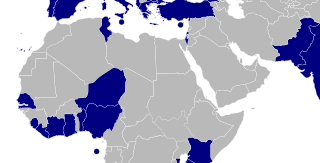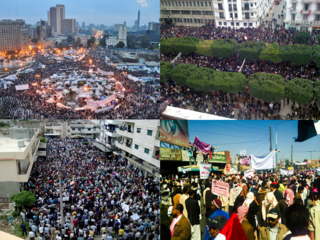Islamism is a political ideology which posits that modern states and regions should be reconstituted in constitutional, economic and judicial terms, in accordance with what is conceived as a revival or a return to authentic Islamic practice in its totality.

The Society of the Muslim Brothers, better known as the Muslim Brotherhood, is a transnational Sunni Islamist organization founded in Egypt by Islamic scholar and schoolteacher Hassan al-Banna in 1928. Al-Banna's teachings spread far beyond Egypt, influencing today various Islamist movements from charitable organizations to political parties—not all using the same name.
There exist a number of perspectives on the relationship of Islam and democracy among Islamic political theorists, the general Muslim public, and Western authors.

The National Democratic Party was the ruling political party in Egypt from 1978 to 2011. The party was founded by President Anwar El Sadat in 1978.

According to The Economist Group's Democracy Index 2020 study, Israel is the only democratic country in the Middle East, while Tunisia is the only democracy in North Africa. The level of democracy in nations throughout the world published by Freedom House, a U.S.-based, U.S. government-funded advocacy organization, and in various other freedom indices, report the Middle Eastern and North African countries with the highest scores are Israel, Tunisia, Turkey, Lebanon, Morocco, Jordan and Kuwait. Countries that have been consistently labelled as 'not free' by Freedom house (2017-2021) have been Iran, Iraq and Egypt. They have been increasingly becoming more and more adverse to the idea of liberal democracy with their scores steadily decreasing, only Iraq out of these countries have maintained some level of internet freedom with a score of 41/100. The remaining countries of the Middle East are categorised as authoritarian regimes, with the lowest scores held by Saudi Arabia and Yemen.

Kefaya is the unofficial moniker of the Egyptian Movement for Change, a grassroots coalition which prior to the 2011 revolution drew its support from across Egypt's political spectrum. It was a platform for protest against Hosni Mubarak's presidency and the possibility he might seek to transfer power directly to his son Gamal; political corruption and stagnation; "the blurring of the lines between power and wealth; and the regime's cruelty, coercion and disregard for human rights."

Ayman Abd El Aziz Nour is an Egyptian politician, a former member of the Egyptian Parliament, founder and chairman of the El Ghad party. Nour was the first man to ever compete against President Hosni Mubarak in the 2005 presidential election. However shortly after announcing his candidacy, Nour was stripped of his parliamentary immunity and arrested on 29 January 2005, a move that was widely criticized by governments around the world as a step backwards for Egyptian democracy. Due to international pressure, Nour was released to participate in the election and was unsuccessful. The election was widely considered to be a corrupt and rigged election. He was arrested again shortly after and released nearly five years later. Nour left Egypt following the 2013 Egyptian coup d'état and spent time in Lebanon for treatment of a wound he sustained while in prison. Nour now resides in Istanbul, Turkey and expresses his hope for returning to Egypt.

The el-Ghad Party is an active political party in Egypt that was granted license in October 2004. El-Ghad is a centrist liberal secular political party pressing for widening the scope of political participation and for a peaceful rotation of power.

The Muslim Brotherhood of Syria is a Syrian branch of the Sunni Islamist Muslim Brotherhood organization. Its objective is the transformation of Syria into an Islamic state governed by Sharia law through a gradual legal and political process.
The Muslim Brotherhood is an Islamic organization that was founded in Ismailia, Egypt by Hassan al-Banna in March 1928 as an Islamist religious, political, and social movement. The group spread to other Muslim countries but has its largest, or one of its largest, organizations in Egypt, where for many years it has been the largest, best-organized, and most disciplined political opposition force, despite a succession of government crackdowns in 1948, 1954, 1965 after plots, or alleged plots, of assassination and overthrow were uncovered. Following the 2011 Revolution the group was legalized, and in April 2011 it launched a civic political party called the Freedom and Justice Party (Egypt) to contest elections, including the 2012 presidential election when its candidate Mohamed Morsi became Egypt's first democratically elected president. One year later, however, following massive demonstrations, Morsi was overthrown by the military and arrested. As of 2014, the organization has been declared a terrorist group by Russia, Egypt, UAE, Saudi Arabia and is once again suffering a severe crackdown.
Secularism—i.e. the separation of religion from civic affairs and the state—has been a controversial concept in Islamic political thought, owing in part to historical factors and in part to the ambiguity of the concept itself. In the Muslim world, the notion has acquired strong negative connotations due to its association with removal of Islamic influences from the legal and political spheres under foreign colonial domination, as well as attempts to restrict public religious expression by some secularist nation states. Thus, secularism has often been perceived as a foreign ideology imposed by invaders and perpetuated by post-colonial ruling elites, and is frequently misunderstood and conflated as equivalent to irreligion or anti-religion.
Authoritarianism is a form of government characterized by the rejection of political plurality, the use of a strong central power to preserve the political status quo, and reductions in the rule of law, separation of powers, and democratic voting. Political scientists have created many typologies describing variations of authoritarian forms of government. Authoritarian regimes may be either autocratic or oligarchic in nature and may be based upon the rule of a party or the military.
Sherifa D. Zuhur is an academic and national security scholar of the Middle East and Islamic world. She was most recently a Visiting Scholar at the Center for Middle East Studies, University of California, Berkeley and is the director of the Institute of Middle Eastern, Islamic and Strategic Studies.

American democracy promotion aims to encourage governmental and non-governmental actors to pursue political reforms that will lead ultimately to democratic governance.

The Arab Spring was a series of anti-government protests, uprisings, and armed rebellions that spread across much of the Arab world in the early 2010s. It began in response to corruption and economic stagnation and was first started in Tunisia. From Tunisia, the protests then spread to five other countries: Libya, Egypt, Yemen, Syria, and Bahrain, where either the ruler was deposed or major uprisings and social violence occurred including riots, civil wars, or insurgencies. Sustained street demonstrations took place in Morocco, Iraq, Algeria, Iranian Khuzestan, Lebanon, Jordan, Kuwait, Oman, and Sudan. Minor protests took place in Djibouti, Mauritania, Israel, Saudi Arabia, and the Moroccan-occupied Western Sahara. A major slogan of the demonstrators in the Arab world is ash-shaʻb yurīd isqāṭ an-niẓām!.

The Yemeni Congregation for Reform, frequently called al-Islah, is a Yemeni Islamist party founded in 1990 by Abdullah ibn Husayn al-Ahmar, Ali Mohsen al-Ahmar, Abdul Majeed al-Zindani, with Ali Saleh's blessing. The first article of Islah basic law defines it as "a popular political organization that seeks reform of all aspects of life on the basis of Islamic principles and teachings".

The Islamist uprising in Syria comprised a series of revolts and armed insurgencies by Sunni Islamists, mainly members of the Muslim Brotherhood, from 1976 until 1982. The uprising was aimed against the authority of the secular Ba'ath Party-controlled government of Syria, in what has been called a "long campaign of terror". During the violent events, Islamists attacked both civilians and off-duty military personnel, and civilians were also killed in retaliatory strike by security forces. The uprising reached its climax in the 1982 Hama uprising.
Following the 2011 Egyptian revolution, the Muslim Brotherhood in Egypt became one of the main forces contending for political power in Egypt against the Supreme Council of the Armed Forces (SCAF) and other established centers of the former Hosni Mubarak regime.
Saʽid Hawwa (1935–1989) was a leading member and prominent ideologue in the Muslim Brotherhood of Syria. Hawwa authored a large number of books that dealt with the proper organizational principles and structures for Islamist organizations, the proper spiritual and practical training for Muslim activists, and issues of interpretation, jurisprudence, and creed in Islam. As a high-ranking member of the Syrian Brotherhood, he was involved in the escalating unrest directed against the Ba`thist regime throughout the 1960s and 1970s and played a role from exile in the latter part of the failed Islamist uprising in Syria of 1976–1982.
Post-Islamism is a neologism in political science, the definition and applicability of which has led to an intellectual debate. Asef Bayat and Olivier Roy are among the main architects of the idea.










